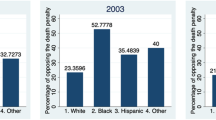Abstract
During most of the twentieth century the very existence of judicial errors was considered an awkward subject in the Dutch legal system. This article considers the change of attitude in recent years. In previous years there was a remarkable self-confidence within the criminal justice system (and in most of the scholarly writings) in doing things the ‘right way.’ After a few warnings from (only partly legally trained) scholars, who became interested in the functioning of the system, and moreover, after a few clear and undeniable cases of judicial error, there was a volte-face in the general feeling amongst both the public and the profession. It is the opinion of the authors that this shift in opinion is historically important. This article therefore intends to draw a picture of the current state of affairs in The Netherlands.
Similar content being viewed by others
Author information
Authors and Affiliations
Corresponding author
Additional information
Theodore A. De Roos is Professor of Law at the University of Tilburg. He has a combined background in criminal advocacy and has held positions in a number of universities in The Netherlands (Utrecht, Maastricht, Leiden, and Tilburg).
Johannes F. Nijboer is Professor of Law at the University of Leiden. He has a scholarly background in the theory of evidence and comparative law.
Rights and permissions
About this article
Cite this article
De Roos, T.A., Nijboer, J.F. Wrongfully Convicted: How the Dutch Deal with the Revision of Their “Miscarriages of Justice”. Crim Law Forum 22, 567–591 (2011). https://doi.org/10.1007/s10609-011-9159-8
Published:
Issue Date:
DOI: https://doi.org/10.1007/s10609-011-9159-8



